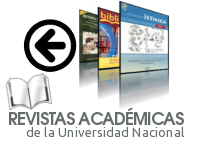Personal Empowerment Process for Women in Domestic Violence Conditions. A College Experience Intertwined with Teaching
DOI:
https://doi.org/10.15359/udre.10-2.4Keywords:
empowerment, gender, violence, against womenAbstract
During the 2017 second term, the School of Psychology of the National University of Costa Rica implemented an experience aimed at contributing to the empowerment of women in the Heredia Province, specifically those who had lived or are living in situations of violence by their intimate partners. The experience was part of the Program for Health Promotion and Awareness: contributions from Psychology. This experience intended to show how academic activity directly relates to teaching practices. The articulation of these components helped strengthen the students’ capabilities and tried to meet a concrete necessity of the Heredia community in health-related matters. Gender violence against women, particularly from their intimate partners, currently represents a growing public health issue; psychology and academia have an unquestionable role to play to study and reduce it. From this, the initiative emerged when implementing a process guided by a participative-methodology proposal. The experience was designed as a workshop focused on gender and built and enabled by the corresponding teacher and students of the course “Modelos de Intervención en Procesos Grupales” (Intervention Models in Group Processes), normally taught in the last year of the bachelor’s degree in psychology. The empowerment process aimed to promote, develop, and strengthen psychosocial aptitudes and skills that allow the participating women to work for a healthy, free-of-violence life. This experience enabled significant changes in women’s beliefs about traditional gender roles, and their place in their sentimental relationship. It helped them redefine their experiences with violence and allowed them to value their accomplishments and reassess their mistakes; it also favored their decision-making and their responsibility for their emotional stability.
References
Abarca, F. (enero-junio, 2016). La metodología participativa para la intervención social: reflexiones desde la práctica. Revista Ensayos Pedagógicos, XI (1). http://www.revistas.una.ac.cr/ensayospedagogicos
Casique, I. (2010). Factores de empoderamiento y protección de las mujeres contra la violencia. http://www.scielo.org.mx/pdf/rms/v72n1/v72n1a2.pdf
Claramunt, M. (2007). Casitas quebradas. San José: Euned.
Convención de Belem do Para. (9 de junio, 1994). Ciudad de Belem do Para, Brasil.
Escuela de Psicología UNA. (21 de mayo, 2015). Programa de Promoción y Atención a la Salud desde el Aporte de la Psicología. http://www.fcs.una.ac.cr/psicologia/doc_psicologia/Programa%20aprobado.pdf
Inamu. (2014). Convención Belém do Pará. http://www.inamu.go.cr/belemdopara
Lagarde, M. (1994). Género e identidades. Metodología de trabajo con mujeres. Fundación para el Desarrollo Educativo y Tecnológico Comunitario. Ecuador: Unicef.
Maton, K. I. (2008). Empowering community settings: Agents of individual development, community betterment, and positive social change. American Journal of Community Psychology. https://www.academia.edu/31021861/Empowering_Community_Settings_Agents_of_Individual_Development_Community_Betterment_and_Positive_Social_Change
Organización Mundial de la Salud. (2017). Violencia contra las mujeres. Datos y cifras. https://www.who.int/es/news-room/fact-sheets/detail/violence-against-women
Poder Judicial. (2018). Femicidio. Observatorio de Violencia de Género Contra las Mujeres y Acceso a la Justicia. https://observatoriodegenero.poder-judicial.go.cr/soy-especialista-y-busco/estadisticas/femicidio/
Downloads
Published
How to Cite
Issue
Section
License

La Revista y cada uno de los artículos que se publican están licenciados por Creative Commons Atribución No comercial Sin derivadas 4.0 Internacional.


